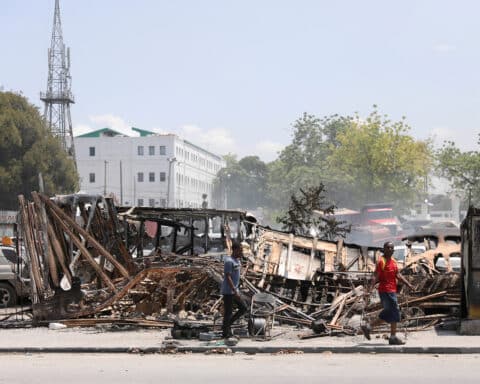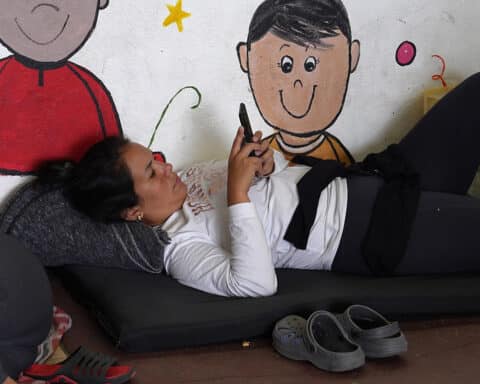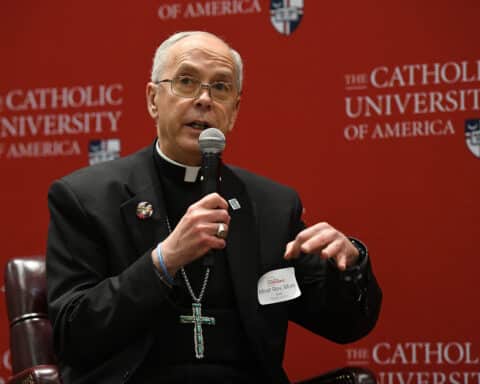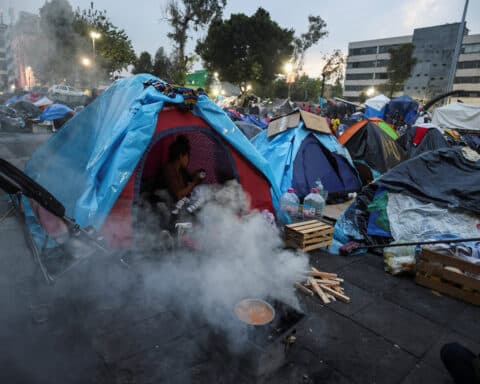Thousands of migrants from Central America’s violent Northern Triangle were still weeks away from reaching Tijuana, Mexico, near southern California, but in late October Father Pat Murphy was already thinking about how to meet their needs.
“When they’re about a week away, and we know how many of them are coming here, then we’ll begin to do more strategic planning,” said Father Murphy, a Scalabrinian priest who heads the Casa del Migrante, a shelter for migrant men in Tijuana.
Father Murphy told Our Sunday Visitor that he and other local migrant-shelter leaders recently met with government officials to review plans in the event that a large percentage of the estimated 4,000-7,000 migrants from Honduras and Guatemala travel through Tijuana.
“We’ll offer them the same shelter we always do,” Father Murphy said. “This isn’t just our problem. This is everybody’s problem.”
As the thousands of Central American migrants crossed through southern Mexico in late October, they received food, water, clothing and other supplies from local Catholic parishes and diocesan migrant ministry officials.
Meanwhile, Catholic immigration advocates and attorneys in the United States have been keeping a close eye on the migrant caravan since news reports in mid-October began telling the story of the growing group of men, women and children in Honduras and Guatemala who were leaving everything behind to journey toward the United States.
“It’s really important to understand the desperation that some of these people are experiencing to cause them, what seems like on a moment’s notice, to leave and begin a journey of thousands of miles,” said Ashley Feasley, the director of migration policy and public affairs at the U.S. Conference of Catholic Bishops.
U.S. government response
News about the latest caravan’s journey, including many eye-catching photos showing thousands of migrants crossing a border bridge between Guatemala and Mexico, has spread like a wildfire in the United States’ 24-hour news cycle and current political climate.
Having campaigned on a platform to crack down on immigration, President Donald Trump seized the migrant caravan story to highlight what he often argues is a broken immigration system that needs stronger border enforcement.
In campaign speeches and on Twitter, the president railed against the caravan, calling it an “invasion of our country” and claiming, without evidence, that “many gang members” and “some very bad people” are in the crowd. According to published reports, the Trump administration in late October was looking to draft an executive order that would virtually close the nation’s border and make it difficult, if not impossible, for Central Americans seeking asylum to gain entry at the U.S.-Mexico border.
On Oct. 29, Homeland Security and Pentagon officials said they were preparing to send more than 5,000 troops to the Mexican border to brace for the caravan’s arrival. Those troops would join more than 2,000 National Guard members already deployed in the area to support border patrol agents.
President Trump, in an interview Oct. 30, also vowed to end birthright citizenship for people born to illegal immigrants by issuing an executive order. That promise is legally dubious — the 14th Amendment to the U.S. Constitution guarantees birthright citizenship — but it generated headlines that could energize the president’s base a week before the 2018 midterm elections. Against that charged backdrop, Catholic immigration officials criticized the president’s rhetoric and recent actions. “If this was an army from a country coming up, with armed combatants, it would be a national emergency that would give the president the power to close the border, but this is not the case,” Appleby said.
Seeking asylum
In an Oct. 29 prepared joint statement, Bishop Joe S. Vásquez of Austin, chairman of the USCCB Committee on Migration; Sean Callahan, president and CEO of Catholic Relief Services; and Dominican Sister Donna Markham, president and CEO of Catholic Charities USA, urged people of goodwill to speak and act with compassion toward migrants.
“We affirm that seeking asylum is not a crime,” they said. “We urge all governments to abide by international law and existing domestic laws that protect those seeking safe haven and ensure that all those who are returned to their home country are protected and repatriated safely.”
As ratified in the United Nations’ 1951 convention on refugees, migrants have a legal right to seek asylum in another country if they have well-grounded fears of persecution based on race, religion, nationality, political opinion or membership in a particular social group. International law also prohibits migrants from being detained simply for seeking asylum.
“If all these people reach the border, they have the right to request asylum. They have the right to an interview where they would be questioned by an asylum officer to determine if they have a credible fear of persecution in their home country,” said Mitzi Hellmer, an immigration attorney based in Virginia.
Hellmer told OSV that any of the migrants who reach the United States may have a difficult time getting the immigration courts — which are controlled by the U.S. Department of Justice — to grant asylum, since U.S. Attorney Gen. Jeff Sessions in June issued a directive declaring that gang violence and domestic violence can no longer be cited in asylum claims.
Like what you’re reading? Subscribe now in print or digital.
“Saying, ‘I’m being extorted, and if I go back home, I’ll be raped or killed,’ is not a strong grounds for asylum any longer,” Hellmer said.
Father Murphy, from Casa del Migrante in Tijuana, said migrants from Guatemala, Honduras and El Salvador often tell him stories of being extorted by cartel thugs and gang members back home who threatened to kill them, their relatives and kidnap their children.
“It’s a pressure we can’t imagine,” Father Murphy said. “They are people coming from utter desperation.”
Brian Fraga is an Our Sunday Visitor contributing editor.





